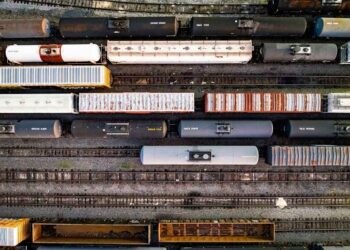The Taste of India will chug on tracks. Narendra Modi government’s first Railway Budget will help country’s dairy sector, especially in Gujarat, spread the ‘milky way’ across the length and breadth of the country.
Union railway minister Sadananda Gowda has announced that railways will take help of Amul and the National Dairy Development Board (NDDB) to transport milk through special tankers.
The announcement has come at a time dairy co-operatives are looking for more opportunities to transport milk through rail route which is speedier, cheaper and pilferage proof compared to the road route.
Anand-headquartered NDDB is already in the process of placing an order for manufacturing 26 high capacity new generation rail milk tankers with the Rail India Technical and Economic Services (Rites), a Government of India enterprise under Ministry of Railways.
On NDDB’s request, the railway has designed the new rail milk tankers with each tanker having capacity of transporting 44,600 litres milk. This tankers, each costing Rs 75 lakh, can be attached to express and mail trains for speedy transportation of milk.
“It is a welcome announcement. Presently, as more milk surplus areas are emerging, dairy co-operatives in the country require more rail milk tankers to transport milk from the surplus regions to milk deficit consumer markets,” NDDB’s managing director Dilip Rath told TOI.
“In wake of Budget announcement, we will further assess the requirements of the dairy co-operatives and put up a comprehensive proposal before the railways,” he said.
Presently, NDDB has a fleet of 95 old rail milk tankers each having capacity of 40,000 litres. With 5 lakh litres per day (LLPD) milk transported through rail route, Amul is the biggest user of the Indian railway network in the dairy sector.
“Railway is the best mode of transporting milk because it is faster and there are no chances of pilferage on route. Also, while farmers will benefit because they can earn better price, consumers, too, will benefit as quality of milk can be maintained,” managing director of GCMMF R S Sodhi told TOI, adding that so far the constraint for the dairy co-operatives was the limited number of rail milk tankers available to transport milk in the country.
Although the member unions of GCMMF transport 5 LLPD through rail route, the remaining 30 LLPD that is transported outside Gujarat is done through roads.
North Gujarat-based Banas Dairy, Asia’s largest dairy union and member of GCMMF, transports milk from Banaskantha to Delhi and Kanpur in Uttar Pradesh. Similarly, Anand-based Amul Dairy uses the rail route to transport milk to Kolkata. “By road, milk from Anand would reach Kolkata in six or seven days. The same milk reaches Kolkata in 36 hours through railway,” Sodhi said.
































